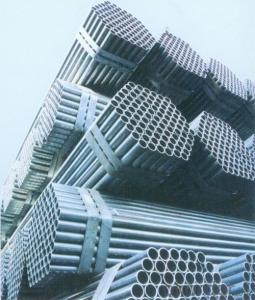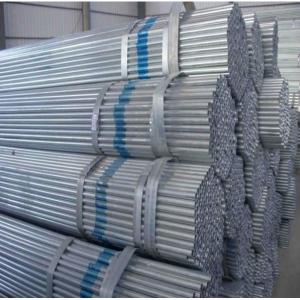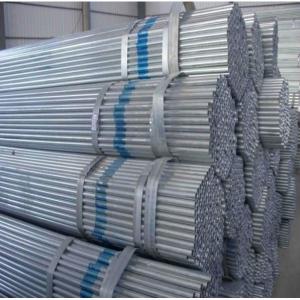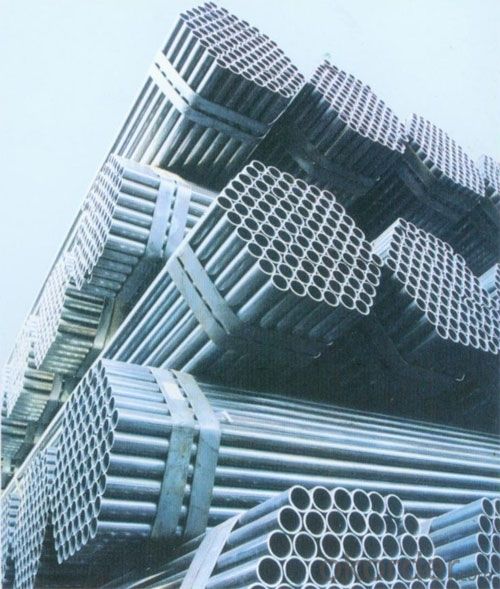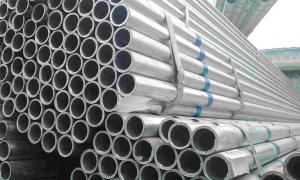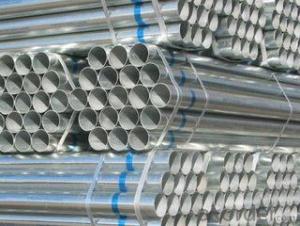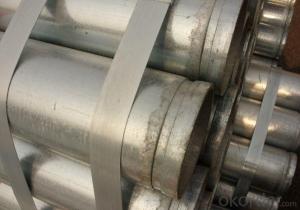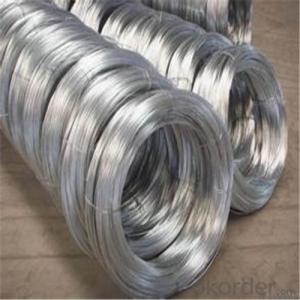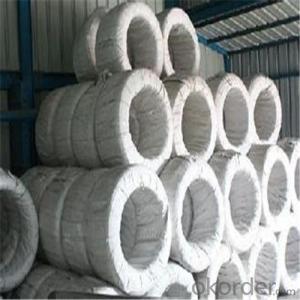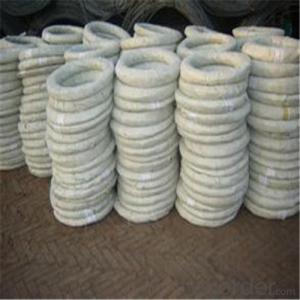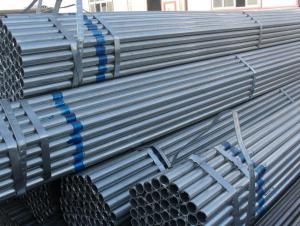GI Hot Dipped Galvanized Steel Tube
- Loading Port:
- China Main Port
- Payment Terms:
- TT or LC
- Min Order Qty:
- 25 m.t.
- Supply Capability:
- 8000 m.t./month
OKorder Service Pledge
OKorder Financial Service
You Might Also Like
1、Structure of GI Hot Dipped Galvanized Steel Tube:
This is Hot-Dipped Galvanized Steel Pipe, it is pipe covered with Zinc.
2、Main Features of GI Hot Dipped Galvanized Steel Tube:
• High manufacturing accuracy
• High strength
• Small inertia resistance
• Strong heat dissipation ability
• Good visual effect
• Reasonable price
3、GI Hot Dipped Galvanized Steel Tube Specification:
Standard | GB, DIN, ASTM ASTM A106-2006, ASTM A53-2007 |
Grade | 10#-45#, 16Mn 10#, 20#, 45#, 16Mn |
Thickness | 8 - 33 mm |
Section Shape | Round |
Outer Diameter | 133 - 219 mm |
Place of Origin | Shandong, China (Mainland) |
Secondary Or Not | Non-secondary |
Application | Hydraulic Pipe |
Technique | Cold Drawn |
Certification | API |
Surface Treatment | factory state or painted black |
Special Pipe | API Pipe |
Alloy Or Not | Non-alloy |
Length | 5-12M |
Outer Diameter | 21.3-610mm |
Grade | 20#, 45#, Q345, API J55, API K55, API L80, API N80, API P110, A53B |
Standard | ASME, ASTM |
1) Material:20#(ASTM A 106/A53 GRB.API5LGRB,GB),45#,16Mn,10#.
2) Specification range:OD:21.3-610mm,WT:6-70mm,length:6-12m or according to the requirement of clients.
3) Excutive standards:GB,ASME API5L.ASTM A 106/A53,Despite of the above standards,we can also supply seamless steel pipe with standard of DIN,JIS,and so on,and also develop new products according to the requirements of our clients!
4) Surface:black lacquered,varnish coating or galvanized.
5) Ends:Beveled or square cut,plastic capped,painted.
6) Packing:bundles wrapped with strong steel strip,seaworthy packing.
4、Packaging & Delivery
Packaging Details: | seaworthy package,bundles wrapped with strong steel strip |
Delivery Detail: | 15-30days after received 30%TT |
5、FAQ of GI Hot Dipped Galvanized Steel Tube:
①How is the quality of your products?
Our products are manufactured strictly according to national and internaional standard, and we take a test
on every pipe before delivered out. If you want see our quality certifications and all kinds of testing report, please just ask us for it.
Guaranteed: If products’ quality don’t accord to discription as we give or the promise before you place order, we promise 100% refund.
②How about price?
Yes, we are factory and be able to give you lowest price below market one, and we have a policy that “ for saving time and absolutely honest business attitude, we quote as lowest as possible for any customer, and discount can be given according to quantity”,if you like bargain and factory price is not low enough as you think, just don’t waste your time.Please trust the quotation we would give you, it is professional one.
③Why should you chose us?
Chose happens because of quality, then price, We can give you both.Additionally, we can also offer professional products inquiry, products knowledge train(for agents), smooth goods delivery, exellent customer solution proposals.Our service formula: good quality+good price+good service=customer’s trust
SGS test is available, customer inspection before shipping is welcome, third party inspection is no problem.
6、GI Hot Dipped Galvanized Steel Tube Images:
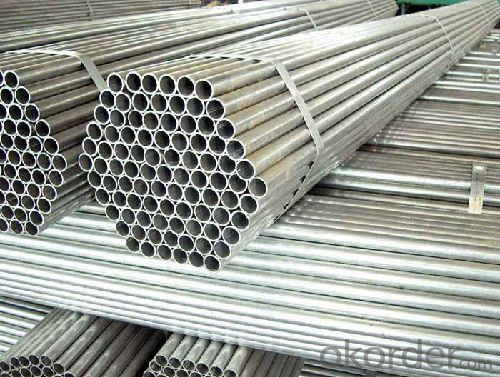
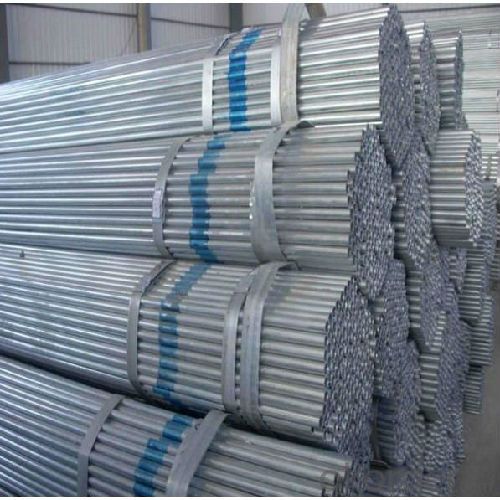
- Q: How do you prevent freezing in steel pipes during cold weather?
- One effective way to prevent freezing in steel pipes during cold weather is to insulate the pipes. This can be done by applying foam insulation sleeves or wraps around the pipes. Additionally, ensuring that the pipes are properly sealed and any gaps or cracks are sealed can help prevent cold air from reaching the pipes. It is also important to keep the pipes warm by maintaining a consistent temperature in the surrounding area. This can be achieved by using a space heater or by allowing warm air to circulate around the pipes.
- Q: How are steel pipes protected during transportation and storage?
- Steel pipes are typically protected during transportation and storage through various measures such as corrosion prevention coatings, wrapping them with protective materials like plastic or rubber, and securing them properly to prevent any damage or movement.
- Q: What type of steel pipe for security windows?
- Stainless steel security window generally use 25 square tubes and 19 round tubes! 25/38 tubes and 22 round tubes are also available!
- Q: What is the role of steel pipes in the aerospace industry?
- Steel pipes play a crucial role in the aerospace industry as they are used in various applications such as aircraft manufacturing, engine components, and fuel systems. These pipes are known for their high strength, durability, and resistance to extreme temperatures and pressure. They provide a reliable conduit for fluids, gases, and hydraulic systems, ensuring efficient operations and safety in aircraft. Additionally, steel pipes are utilized in structural components like landing gear, frames, and support structures due to their ability to withstand heavy loads and maintain structural integrity under dynamic conditions. Overall, steel pipes are essential in the aerospace industry for their versatility and reliability in critical systems and structures.
- Q: What are the different joining methods for steel pipes?
- There are several joining methods for steel pipes, including welding, threaded connections, flanged connections, and mechanical couplings. Welding involves melting the ends of the pipes and fusing them together using heat. Threaded connections involve screwing the pipes together using threaded ends. Flanged connections use flanges that are bolted together to connect the pipes. Mechanical couplings use a variety of methods such as compression fittings or grooved couplings to connect the pipes without welding or threading.
- Q: How are steel pipes measured and categorized?
- Typically, steel pipes are measured and categorized by their outer diameter, wall thickness, and length. The outer diameter represents the width of the pipe when viewed from the side, while the wall thickness refers to how thick the pipe's walls are. These measurements are usually given in millimeters or inches. Categorizing steel pipes is done based on their purpose and specifications. The most common way to categorize them is by their pressure rating, which determines their ability to handle different levels of internal or external pressure. Pipes are divided into different pressure classes, like Schedule 40, Schedule 80, and Schedule 160, to name a few. The higher the pressure class, the thicker and stronger the pipe is. Steel pipes can also be categorized according to their manufacturing process and material composition. For instance, seamless steel pipes are created by piercing a solid steel bar to create a hollow tube, while welded steel pipes are made by rolling and welding a flat steel sheet or strip into a cylindrical shape. Additionally, steel pipes can be classified based on their material composition, such as carbon steel pipes, stainless steel pipes, or alloy steel pipes. Another way to categorize steel pipes is by their end connections or fittings. Common types of pipe ends include threaded ends, which are suitable for attaching fittings by screwing them onto the pipe, and plain ends, which are typically used for welding or flanging connections. In conclusion, the measurement and categorization of steel pipes are crucial for ensuring the proper selection and usage of these pipes in various industries, including construction, oil and gas, plumbing, and manufacturing.
- Q: How are steel pipes classified based on their end connections?
- Steel pipes can be classified based on their end connections into three main categories: threaded, socket-weld, and butt-weld.
- Q: Are steel pipes suitable for use in nuclear power plants?
- Yes, steel pipes are suitable for use in nuclear power plants. They are commonly used in various systems such as cooling, steam, and reactor coolant systems due to their high strength, durability, and resistance to corrosion. Additionally, steel pipes can withstand the high pressure and temperature conditions present in nuclear power plants, making them a reliable choice for this critical infrastructure.
- Q: What are the different types of steel pipes available in the market?
- In the market, one can find a variety of steel pipes, each designed for specific purposes and applications. Some of the commonly used types are as follows: 1. Carbon Steel Pipes: These pipes are widely utilized due to their strength and durability. They are primarily employed in industries like oil and gas, construction, and plumbing for fluid and gas transportation. 2. Alloy Steel Pipes: By combining carbon steel with different metals like chromium, nickel, or molybdenum, alloy steel pipes offer enhanced strength, corrosion resistance, and heat resistance. They find applications in high-pressure environments such as power plants and chemical plants. 3. Stainless Steel Pipes: Highly resistant to corrosion and oxidation, stainless steel pipes are suitable for applications requiring hygiene and durability. Industries like food processing, pharmaceuticals, and water treatment commonly use them. 4. Galvanized Steel Pipes: These pipes are coated with a layer of zinc to protect against rust and corrosion. They are commonly found in plumbing systems and structures like fences and handrails. 5. Seamless Steel Pipes: These pipes are manufactured without any welding or joints, resulting in a smooth and continuous surface. They are known for their high strength and are often used in high-pressure applications. 6. Welded Steel Pipes: Made by rolling or bending a flat steel plate into a cylindrical shape and welding the edges together, welded pipes find common usage in construction, oil and gas, and automotive industries. 7. ERW (Electric Resistance Welded) Steel Pipes: ERW pipes are produced by passing a high-frequency electrical current through a steel strip, causing it to heat and form a weld. They are widely utilized in plumbing, water wells, and structural support. 8. LSAW (Longitudinal Submerged Arc Welded) Steel Pipes: LSAW pipes are created by bending and welding steel plates into a cylindrical shape. They are commonly employed for long-distance transportation of large volumes of oil, gas, or water. These examples represent only a fraction of the diverse range of steel pipes available in the market. The choice of the appropriate pipe type depends on factors such as the intended application, environmental conditions, and budget constraints. Consulting with experts or professionals is crucial in determining the most suitable steel pipe for a specific project or application.
- Q: How are steel pipes used in the manufacturing of agricultural machinery and equipment?
- Steel pipes are commonly used in the manufacturing of agricultural machinery and equipment due to their strength, durability, and versatility. These pipes are used for various purposes such as forming the structural framework, creating hydraulic systems, and providing conduits for fluid and air transportation. Whether it's for building tractor chassis, constructing irrigation systems, or manufacturing grain storage equipment, steel pipes play a crucial role in ensuring the reliability and efficiency of agricultural machinery.
Send your message to us
GI Hot Dipped Galvanized Steel Tube
- Loading Port:
- China Main Port
- Payment Terms:
- TT or LC
- Min Order Qty:
- 25 m.t.
- Supply Capability:
- 8000 m.t./month
OKorder Service Pledge
OKorder Financial Service
Similar products
Hot products
Hot Searches
Related keywords
